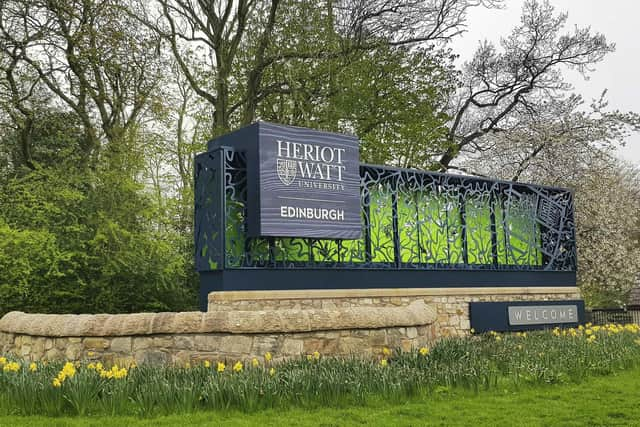Edinburgh's Heriot-Watt hails 'pivotal milestone' after joining forces to combat climate change
Edinburgh’s Heriot-Watt University has hailed a “pivotal milestone” after joining forces with the University of Houston in the US to accelerate clean energy research and help combat climate change.
Representatives from both institutions have signed a memorandum of understanding as they commit to work together on “cutting-edge” research as well as provide opportunities for students and staff to participate in international exchange programmes. With a focus on clean energy, the joint agreement aims to address “pressing societal challenges with the climate emergency at the forefront”.
Advertisement
Hide AdAdvertisement
Hide AdAt the heart of the tie-up lies a commitment to advance research that helps society deliver a just energy transition, with a particular emphasis on hydrogen. With Heriot-Watt’s expertise in green hydrogen now coupled with Houston’s strong capability in developing appropriate systems, the agreement lays the foundations to accelerate hydrogen technology.


Gillian Murray, deputy principal of business and enterprise at Heriot-Watt University, said: “This agreement represents a pivotal milestone in the international development of our global research institutes, forging a new partnership to address the most pressing societal challenges that lie ahead. It also opens exciting opportunities not only in scientific endeavour but also for our students to engage in international learning experiences, broaden their perspectives and develop valuable skills for their future careers.
“Through partnership research projects and potential exchange projects, we look forward to nurturing the next generation of leaders who will drive positive change in our interconnected world.”
The signing of the agreement was marked with a two-day technology workshop involving research academics from both universities.
Ramanan Krishnamoorti, vice-president for energy and innovation at the University of Houston, said: “I am thrilled to witness the official celebration of our shared commitment to advancing transformative energy solutions. Through this partnership, we aim to harness our collective expertise to address pressing energy challenges and drive sustainable innovation on a global scale.”
Heriot-Watt has five campuses, in Edinburgh, the Scottish Borders, Orkney, Dubai and Malaysia. Some 27,000 students from 154 countries are currently studying with the institution, which was founded in Edinburgh in 1821 as the world’s first mechanics institute.
Last year, Heriot-Watt launched a centre for green hydrogen innovation in a bid to strengthen industry links and boost Scotland’s net zero credentials. The venture was rolled out by the Edinburgh institution in collaboration with hydrogen technology specialists Logan Energy and PlusZero. The newly named Hydrogen Works building will see the consortium collaborate across a range of hydrogen-related research and industry projects, including clean-power generators, state-of-the-art refuelling infrastructure and cutting-edge energy systems for heavy industry.
As part of Heriot-Watt’s strategy to engage with business and become a leader in sustainability, it is reshaping its Riccarton campus in the capital to house innovative companies and clusters, including Logan Energy and PlusZero. It is estimated that Scotland’s energy-intensive industry, which relies on fossil fuels, is responsible for up to 15 per cent of the nation’s greenhouse gas emissions.
Murray said: “Working hand-in-hand with business is at the very heart of what we do at Heriot-Watt University.”
Comments
Want to join the conversation? Please or to comment on this article.